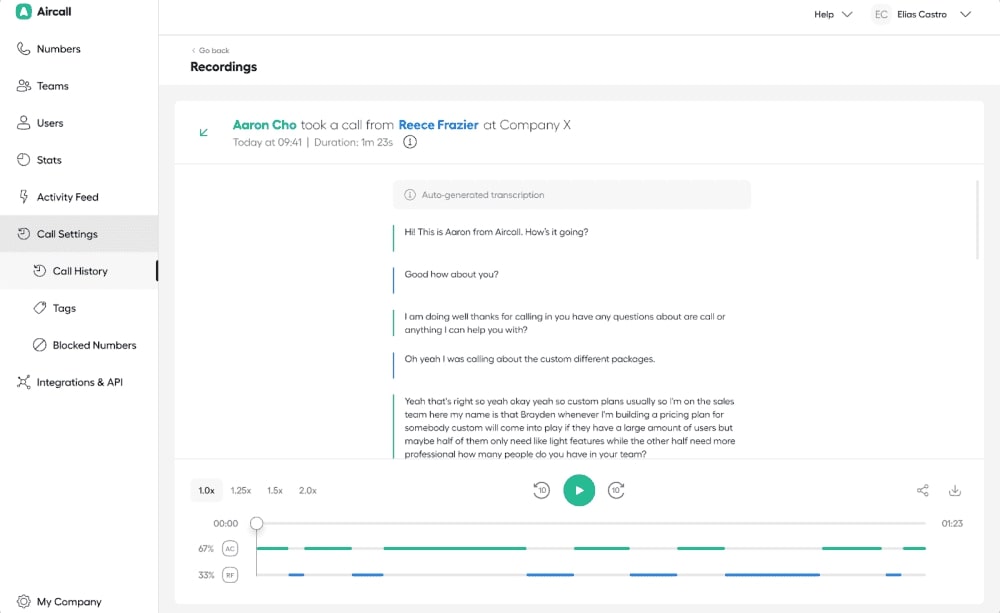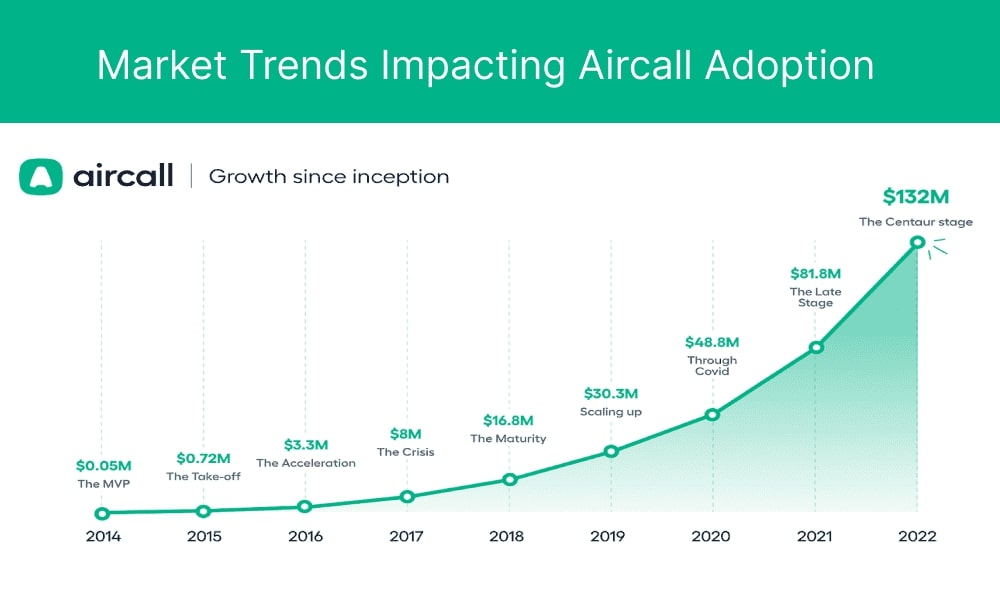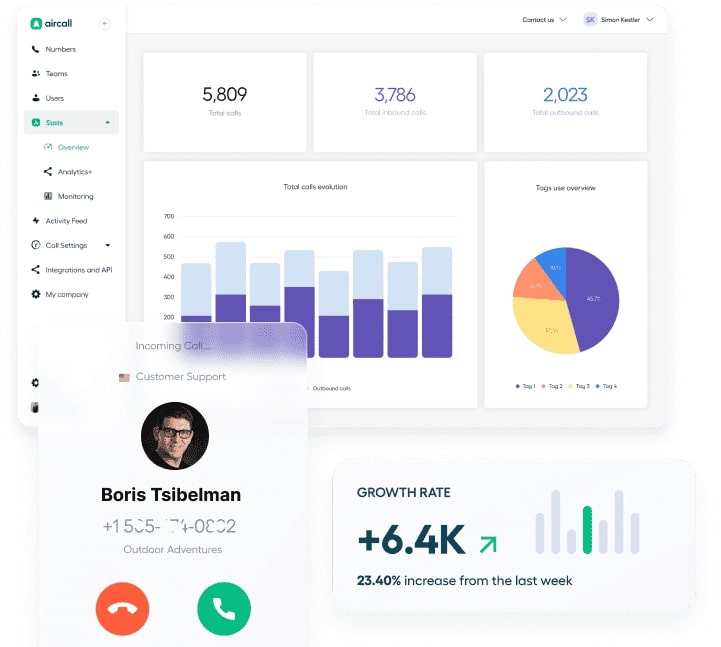The rapidly changing world of business communication is heavily influenced by technological advancements and market dynamics. Organizations increasingly use VoIP (Voice over Internet Protocol) solutions to streamline communication. Aircall is a leading choice for many businesses because of its comprehensive features tailored to modern needs. However, keeping pace with Aircall’s future trends is crucial as the communication landscape evolves.
Understanding the current and future trends in Aircall technology is vital for business leaders who aim to maintain efficient customer interactions, sales operations, and internal collaboration. This blog post provides a deep dive into the future trends of Aircall in business communication, exploring the technological innovations, market shifts, and industry-specific applications that will shape its evolution. With strategic insights and practical recommendations, this comprehensive guide will equip business leaders with the knowledge to adapt to these emerging changes effectively.
Table of Contents
ToggleWhat is Aircall’s Present Role in Business Communication?

Aircall, renowned for its cloud-based call center software, has carved out a significant niche in the business communication landscape. Its key features, including easy call routing, integration capabilities, and real-time analytics, provide substantial benefits for businesses of all sizes. Here’s a closer look at how Aircall is currently shaping business communication:
Ease of Integration
Aircall integrates with popular CRM systems like Salesforce and HubSpot. This integration allows automatic call data logging, which is crucial for maintaining comprehensive customer records and ensuring continuity in customer service and sales strategies.
Scalability
Aircall’s scalable solutions benefit small startups and large enterprises alike. The platform easily adjusts to a business’s changing size, a valuable feature in today’s rapidly evolving business environments.
Advanced Call Features
Features such as call queuing, forwarding, and on-hold music enhance the professionalism and efficiency of business communications. These features ensure customer calls are handled effectively, improving overall customer satisfaction.
Real-Time Analytics
Aircall provides detailed insights into call volumes, wait times, and individual performance metrics. These analytics help managers make informed decisions to improve team performance and customer service quality.
Technological Trends Shaping the Future of Aircall

AI-Powered Communication
Artificial intelligence is poised to transform how Aircall supports communication. Expect features like live transcription, voice sentiment analysis, and intelligent chatbots to become more common. These tools will automate routine queries and empower agents to focus on meaningful conversations. The future of Aircall will include AI that listens, learns, and helps businesses deliver faster, more personalized service.
Integrations and API Enhancements
Businesses rely on many tools to manage operations; seamless integration is key. The future of Aircall will focus on expanding API capabilities, allowing companies to build custom workflows and create smoother cross-platform communication.
Instead of switching between systems, Aircall will be the central hub that connects voice communication with your CRM, helpdesk, marketing automation tools, and more.
Cloud-Based Scalability
Cloud technology is essential in today’s business environment. Aircall’s cloud-first design supports easy scalability. Businesses can add users, launch new offices, or expand globally without complex setup or infrastructure. The future of Aircall includes increased flexibility, better uptime, and more robust data protection, all while supporting hybrid and remote work models.
Data Analytics and Insights
As call data becomes a strategic asset, Aircall is evolving to offer deeper, more actionable analytics. The future of Aircall includes predictive analytics, performance dashboards, and insights that help managers make smarter decisions. Instead of just tracking calls, Aircall will help businesses understand customer behavior, identify trends, and improve service delivery.
Market Trends Impacting Aircall Adoption

Rise of Remote and Hybrid Work Models
Remote and hybrid work are here to stay. Aircall is built for distributed teams, allowing employees to connect from anywhere. With mobile apps, browser-based calling, and team analytics, businesses can ensure productivity and consistency no matter where employees are based. As this trend continues, the future of Aircall will focus even more on mobility, accessibility, and real-time collaboration.
Emphasis on Customer Experience
Customers expect fast, personalized service. Businesses must adapt by understanding customer needs and delivering consistent communication. Aircall’s integrations with CRMs and automation tools make this possible. As expectations rise, the future of Aircall will include tools that support real-time personalization, customer journey tracking, and more innovative engagement strategies.
Regulatory Compliance
With data privacy regulations like GDPR and HIPAA becoming stricter, businesses need tools that meet compliance standards. Aircall already provides secure call recording and encrypted storage. In the future, expect additional compliance features designed to help industries like healthcare, finance, and legal meet evolving regulatory requirements.
Future Use Cases of Aircall Across Different Industries

Aircall’s versatility positions it well to address the diverse needs of various industries. Here’s a look at how future trends will influence its application across different sectors:
Customer Support and Sales
Sales and support teams will benefit from more brilliant call handling. Aircall will continue to automate tasks like routing, logging, and follow-ups, allowing teams to focus on building relationships.
Unified communication will become standard. With Aircall, all interactions—calls, notes, and customer data—can be accessed in one place, leading to faster resolutions and higher satisfaction.
Healthcare and Telemedicine
Secure and efficient communication is critical in healthcare. Aircall’s HIPAA-compliant infrastructure already supports telemedicine, and future developments will offer even more security and automation.
Patients will be quickly connected to the right professionals, while providers will benefit from AI-assisted scheduling, call tagging, and faster documentation.
Finance and Legal
Accurate recordkeeping and security are top priorities for finance and legal professionals. Aircall’s automatic transcription and encrypted call recording help ensure regulatory compliance.
As the platform evolves, legal teams will gain access to searchable transcripts, more innovative storage options, and enhanced access control for sensitive data.
E-Commerce
E-commerce businesses rely on rapid customer support to drive sales. Aircall enables fast responses with integrated customer data and global phone number support.
As brands grow internationally, the future of Aircall will support multilingual communication, intelligent routing, and automation tools that help boost conversions and customer retention.
Conclusion
To sum it up, the future of Aircall is about more than just making calls. It’s about transforming business communication with AI, deeper integrations, scalable infrastructure, and intelligent analytics.
Aircall is positioned to become a strategic platform that supports remote work, enhances customer experience, and adapts to industry-specific needs. Businesses that invest in Aircall now are not just choosing a VoIP provider. They’re choosing a future-ready solution built for agility, growth, and long-term success.
Organizations looking to stay competitive in this fast-moving landscape should consult with Axis Consulting to actively monitor Aircall’s evolution and incorporate it into their strategic communication plans.
FAQs About the Future of Aircall
Will AI features be standard in Aircall moving forward?
Yes, AI-driven tools like sentiment analysis, transcription, and smart routing are core to Aircall’s development roadmap.
Can Aircall support fully remote customer service teams?
Absolutely. Its cloud infrastructure is built for remote work and global scalability.
Is Aircall compliant with privacy laws like GDPR or HIPAA?
Yes. Aircall offers encrypted storage, role-based access, and compliance with major data security regulations.
How does Aircall help sales teams?
By logging calls, integrating with CRMs, and offering performance insights, Aircall boosts conversion and engagement rates.
Is Aircall future-proof for growing businesses?
Yes. Its scalable pricing, robust integrations, and evolving tech stack make it ideal for long-term growth.